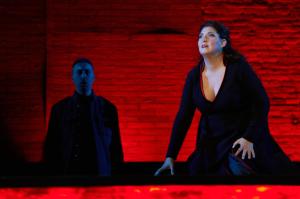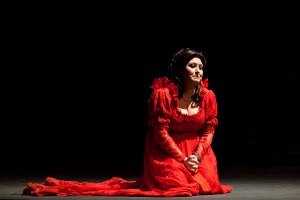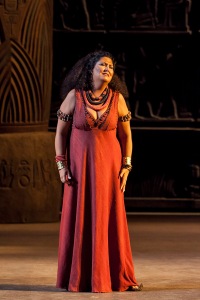Anna Pirozzi interview with Coloraturafan
In the wake of Anna Pirozzi’s much anticipated U.S. debut at the San Francisco Opera, Coloraturafan had the wonderful opportunity to learn a little bit more about this fascinating soprano.

Coloraturafan: Anna, you sing a large repertory, but you are probably most famous for Abigaille in Verdi’s Nabucco. This is a notoriously difficult role, and yet it seems to stay a constant in your repertory. How do you manage the role, and what do you think about the attitude that it puts extreme vocal demands on the soprano?
Anna: Abigaille is one of the roles I have performed most, and in all sincerity when I know I must sing it, I don’t worry too much: I have sung it so many times that I can only concentrate on the new staging, on developing this character according to the wishes of the new stage director. So, vocally it does not worry me too much, I don’t know why but it has always been like this, I have never had a technical problem with this role: I have always faced it with great serenity and joy. Although singing it does not tire my voice, I always alternate it with more lyric roles so as to rest my voice.
Coloraturafan: Following up on your interpretation of Abigaille, you are one of few sopranos that take what I would call a “Bel Canto” approach to the role. For instance, you decorate the cabaletta “Salgo gia di trono aurato” which for me fits perfectly into the musical structure and certainly adds to the enjoyment of the music. Is this how you initially studied the role and how did you come to this musical approach?
Anna: Honestly when I sing Abigaille I do not think “let’s sing it in a bel canto style”: I

sing all my roles with my voice, keeping it in a high position, without darkening it artificially, without transforming it. Regarding the cabalettas, I think that in Verdi it is not possible to perform a lot of variations because Verdi is not Rossini, and so I tend to agree with those conductors with whom I worked and who allow a only modest amount of variations, which we have agreed upon beforehand. I don’t write my own variations, but rely on the conductor’s suggestions.
Coloraturafan: You are about to make your United States debut, singing Maddalena from Andrea Chénier in San Francisco? (Toi, toi, toi!!!) Until now, your career has been mainly in Europe; does this mean you will be singing in U.S. houses more often? If so, can you share any details about upcoming venues?
Anna: Viva il lupo for this Maddalena of my U.S. debut! Yes, so far I have sung a lot in Europe and I am here in America for the first time. Here everything is bigger, there is much more media exposure and publicity, but my approach is to try to stay serene and calm. It is not a role I have performed too often, but I fell in love with it as soon as I opened the score, and so I sing it with so much joy and emotion, also because it reminds me of some events in my life that were not too happy and this increases those feelings. Regarding my future engagements in the U.S, it is not up to me to say this, but they seem to be very happy with me here in San Francisco and we are already discussing future projects, so I can say I will definitely return here. Then there are projects with Maestro Domingo for Los Angeles, and also Chicago and – hopefully – sooner or late the Met, too.

Coloraturafan: Going back to your repertory, you sang Elisabetta in Roberto Devereux in Bilbao last year. This was originally planned for a different soprano, how much time did you have to prepare the role? With the huge success that followed your debut in Devereux, do you feel this is a stepping stone to future Donizetti and Bellini roles? I see on your website that you are working on Lucrezia Borgia, Anna Bolena, Norma and Maria Stuarda, are these roles already scheduled, or are they simply planning to sing one day?
Anna: Roberto Devereux was a surprise, and consequently I didn’t have too much time to prepare it; fortunately I learn quickly enough. I certainly need my time to study and memorize the notes, but generally I tend to understand quickly the musical requirements of a character. I adore Elisabetta, I can’t wait to sing it again, and honestly I did not think at first that it would have suited me so well. I’d like to add to my repertoire more Donizetti roles, particularly the two other queens. At the moment they are not in my schedule but I am waiting for offers. On the contrary, I am going to debut Norma in Verona in April 2017. This is for me an extremely important role, like for almost every soprano I think; it is an arrival point in a soprano’s career, and it could be one of those great roles that could accompany me all throughout my career.
Coloraturafan: One of the things that stands out most to me in your singing of roles like Abigaille and Elisabetta, is your originality and your attention to bel canto style. How exactly do you prepare for a new role? Do you write your own cadenzas and ornamentation? Some singers listen to recordings for inspiration for example.
Anna: First I study a new role at the piano myself, and when I have more or less memorized the notes, I go to a music coach and I study it with all the required dynamics. Honestly I do listen to the old recordings and also to more recent once and take some inspiration from the sopranos I admire, but then I make the role my own with my own voice and my personality. I don’t write my cadenzas. I have no problems to say that I believe that writing variations and cadenzas should be done my musicians who have studied an instrument: I studied voice and devote myself to singing.
Coloraturafan: Being Coloraturafan, I must ask you about your high notes. Not all of your roles

require crazy high notes, but you have certainly added your share. I have found a few videos online where you sing the infamous high Eb in your duet with Nabucco. Such dramatic high notes are certainly thrilling! Do you feel pressure to sing the added high notes, and what are your thoughts on interpolating high notes to Verdi and now Donizetti roles?
Anna: I adore acuti and sovracuti, and I put them wherever and whenever I can, as long as they are pertinent and in style with the opera or the performing tradition. I’d like to use these extreme high notes as long as I have them so as not to lose them; with the passing of time and the nature of the human voice one tends to lose these notes, and so I’d like to take advantage of them while I have them.
Coloraturafan: What are your thoughts about singing in “modern” or “regietheater” productions?
Anna: I like modern productions if they have a meaning, if they follow the story of the libretto. I’ve had unhappy experiences with productions that in my view went way too far, and in general I prefer traditional stagings that respect the period in which the opera take place. Singers generally speaking, like to wear, say, 19th century or 18th century costumes, and so why should these directors deprive us of this joy? A singer gives her or his best when wearing nice looking costumes, I think they inspire you to sing better.

Coloraturafan: When you are singing a role like Tosca, one that has been done so many times before, how do you approach the role to make it your own? And more specifically since we are speaking about Tosca, in verismo opera, do you feel there is a greater emphasis placed on the importance of the text than say in early Verdi or Donizetti?
Anna: Tosca is a role I sing with tranquillity. When I am about to perform it, my main concern is to go over some passages that are musically tricky. Tosca is very close to my personality and I certainly leave my print on her when I sing her. I think only the second act can be defined truly “verista”. The text is important and I always sing it with great pleasure.
Coloraturafan: Looking at your list of roles, there is a spectacular list of Verdi heroines; someone could easily say you are a Verdi specialist. What are your thoughts on early Verdi roles like Lucrezia Contarini or Odabella versus later Verdi roles like Aida or Elisabetta?
Anna: I sing a lot of Verdi. I feel Verdi in my vocal cords. No doubt there is a big difference between early and late Verdi. Lucrezia Contarini is a role I have found very difficult; Odabella and Abigaille are coloratura roles, the Verdi coloratura of course. Then you have more lyric roles such as the Trovatore Leonora and Aida. I adore all Verdi; I sing him with so much love, but his vocal writing is difficult and requires a solid technique as well as the right type of voice. For instance, the Trovatore Leonora, which for me at least is his most arduous role, calls for a voice that possesses everything: a lyric and a dramatic side, agility, pianissimos, forte and fortissimos, everything. I hope I’ll be able to perform almost all his roles, particularly Elisabetta in Don Carlo, while Odabella is already in my schedule. Then, there won’t be many more Verdi roles left. Viva Verdi!
Coloraturafan: Do you have a favorite singer, or a recording, that you feel inspired you as an opera singer?
Anna: I have a good number of singers I admire and I consider as a reference for my career. Many of my colleagues say it is not good thing, but I am not ashamed to say that I often listen to the singers of the past because after all they had successful careers, and above all there is Maria Callas, whom I loved from the very beginning. It was love at first sight, or better at first hearing.Then I’d like to mention Ghena Dimitrova, who was my model for a role like Nabucco, and then Daniela Dessì. I am still in shock about her passing, and I loved her the very first moment I heard her voice. I was fortunate to attend one of her masterclasses and I treasure every bit of advice she gave me, so much so that I pass them on to some of the young students I teach. She was an immense artist; she may be gone, but in truth she is eternal and will always remain in our hearts. Other singers I often listen to are Aprile Millo, Renata Tebaldi and Barbara Frittoli. I love Italian singers and I believe that we Italians have an edge over non Italian singers, the language, at least in the Italian repertoire of course.
Coloraturafan: Is there one role, or aria, that you consider your favourite? Either to sing or to hear?

Anna: Perhaps my favorite role is the Trovatore Leonora, but also Maddalena di Coigny, and I am not saying this because I am just about to sing it. Regarding single arias, I love Odabella’s second aria, but were I forced to choose, I’d select “D’amor sull’ali rosee”, the most beautiful and difficult soprano aria. But to tell you the truth I couldn’t live without some moments of Elisabetta, such as the fantastic “Tu che le vanità”, and all the arias in Forza del destino, from “Me pellegrina ed orfana”, to the Convent scene and of course “Pace mio Dio”. I love all Verdi.
Coloraturafan: I always ask this question, even if it is a bit controversial. There are theaters that are using sound enhancement, or amplification. As a singer, how do you feel about sound enhancement, and do you find it difficult to sing in these venues?
Anna: We singers detest microphones: they distort the voice and the audience hears a sound that is not ours. It is without a microphone that the true quality of a singer is measured, that is if one is able to fill the whole house with no help. Fortunately I had to use a microphone only during a television or radio broadcast.
Coloraturafan: Since your big success in Roberto Devereux, I know many Bel Canto lovers are hoping that you will become the new super star in this repertory, we have talked a little about your delving into more Donizetti and Bellini, but there are still a lot of heavyweight roles on your roster. Vocally speaking how do you manage singing bel canto after so much verismo? And do you feel that the heavy roles take a toll on your voice’s ability to remain flexible enough for the coloratura needed in Bel Canto?
Anna: I have already partially answered this last question, I think. Not all Donizetti roles are written in the same way of course, there is a lot of difference among the several Donizetti roles, and even more so between Donizetti and late Verdi. In any case, like my teacher, baritone Federico Longhi says, the voice is not like an elevator: you cannot settle a role in your throat, metter in gola like the Italians say, in just a few days. Also, you need a physiological rest between roles: one needs to rest through silence. When I debut a new role I request the material and physical time to prepare it as best as I can, without jumping from one role to the next. The voice is not a machine, it is made of muscles and we must take extremely good care of it if we want to last for a long time in this profession.
Our sincere thanks to Ms. Pirozzi for taking the time to answer these questions, and we are all wishing her a huge success in her U.S. debut!